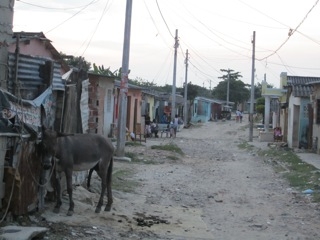
Donkeys are often used to cart vegetables, fruit and housewares for sale on the streets of Barranquilla.
The reports are not verified, but they provide a real tip sheet for what could end up being some terrific stories for journalists to work on as the Oct. 30 date for local elections approaches.
We are doing some workshops for El Tiempo journalists on how to best access the information on the map for story leads. But I was also curious to know who signs up to be an electoral observer, so I accompanied Camilo Mancera, an MOE lawyer, to Barranquilla where he was conducting a training session. An added bonus to the trip – when I talked about it with El Tiempo National Editor Luis Miña, he got enthusiastic and assigned a Barranquilla reporter to do a story on the training.
The day-long session was held in a downtown Barranquilla business center. About 20 people showed up; some university students, a couple of teachers, university professors, and some unemployed women. All thought working with MOE as observers was a good way to get involved and do something.
Colombia is very polarized and very politicized – understandable, when you consider the decades of civil conflict that has gone hand-in-hand with corrupt politicians and accompanying social ills. But Camilo emphasized the absolute need for impartiality and neutrality from election observers. No speaking out for candidates. No t-shirts with political slogans. On Election Day, they are there to observe, to watch and to report on what they see. No more, no less. No objections from those getting trained.
I have been an international election observer twice, in Nicaragua and Venezuela. I imagine that is a much easier task than being an election observer in your own hometown. An international observer is in and out and has no concerns about repercussions that could come later. We are gone, by the time anyone has a chance to complain. But here, the observers may know the people at the polling places they are observing. Their job will be a lot tougher than mine. But all seemed up to the task and excited about getting involved.
One young woman who was there for the training really caught my attention. Her name is Sandra Prezon. She is a community activist in the El Bosque neighborhood of Barranquilla, in the poorer part of the city. A couple of years ago, Sandra was named an “honored daughter” of Barranquilla for her neighborhood work. She said her desire to make her neighborhood, her community, her city a better place led her to volunteer to be an election observer. She is involved with many projects, including an effort to start a community radio station. Sandra loves her barrio with all its faults and she took me on a tour. One of the country’s main prisons is in this neighborhood. It is common to see a man with a mule harnessed to a wooden cart carrying fruits or vegetables or household wares to sell. Sandra walks these unpaved streets like a politician courting votes. Everyone knows her and greets her.
A bit more about this industrial port city, about 500 miles from Bogotá. Barranquilla is hot and humid. I would like to say sultry, but that doesn’t really fit. Sweaty is a better description. It is also loud. Life is lived on the streets. Doors are left open. Dominos is a popular game and the fichas – or dominos – are matched up on the table with a loud thud. Billiards is popular, played inside buildings with four walls and a roof but the storefront is open. It is almost as good as being outside. Another custom – stores with loudspeakers facing streetside. Salsa blares. People dance. The corner store in the neighborhood becomes a dance club. A bit of color that for me makes Barranquilla stand out.